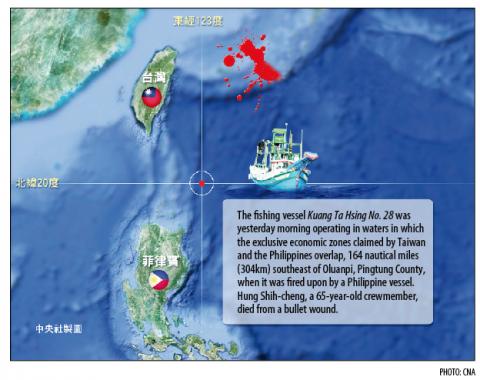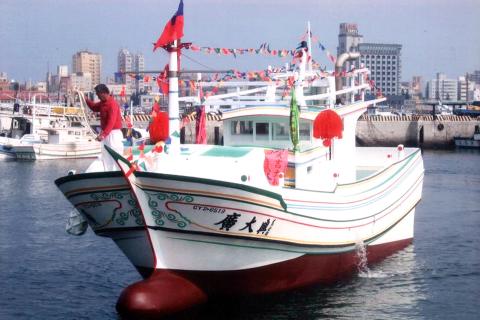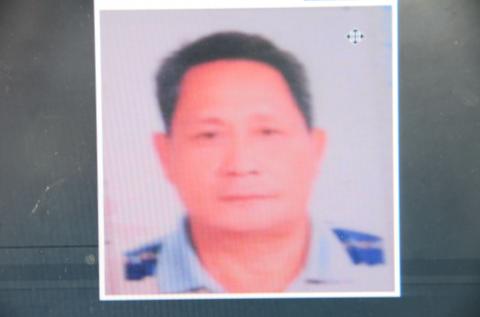A Taiwanese fisherman was shot dead yesterday during a confrontation with a Philippine vessel in waters in which the exclusive economic zones claimed by Taiwan and the Philippines overlap, the Ministry of Foreign Affairs said.
While Fisheries Agency Deputy Director-General Tsay Tzu-yaw (蔡日耀) was quoted by the Central News Agency as confirming that the shots fired at the Pingtung-based fishing boat Kuang Ta Hsing No. 28 that killed 65-year-old Hung Shih-cheng (洪石成) came from a Philippine navy ship, the ministry said last night that the Philippine ship had not yet been identified.
The incident occurred at 10am yesterday, when the Kuang Ta Hsing No. 28 — captained by Hung’s son, Hung Yu-chih (洪育智), and with Hung Shih-cheng, his son-in-law, and one Indonesian national as its crewmembers — was operating at around 164 nautical miles (304km) southeast of Oluanpi (鵝鑾鼻), Pingtung County, the ministry said.

Photo: CNA
The Coast Guard Administration (CGA) said it received a call for aid from the fishing vessel at 1pm yesterday.
Donggang Fishermen’s Association chief executive Lin Han-chou (林漢丑) said Hung Shih-cheng’s family called in to the local fishery radio station to report an attack on their vessel by Philippine naval forces, saying it had been incapacitated.
They told the station that Hung Shih-cheng was severely injured and that they needed a helicopter to take him to hospital immediately, Lin said, adding that his family called in again soon after and said he had died from his injuries.

Photo: Yeh Yung-chien, Taipei Times
The CGA said a 2,000-tonne ship equipped with an automatic cannon and two 50mm machine guns had been dispatched, which arrived at 7pm last night. It was to accompany the Kuang Ta Hsing No. 28 as it waits for a tow back to port today, the CGA added.
Liouciou Fishermen’s Association chief executive Tsai Pao-hsing (蔡寶興) said the incident occurred well within the parameters the Pingtung County Government had set for fishing.
“The fact that our fishermen are being shot at by the Philippines in a temporary law enforcement zone of our designation shows that our fishermen are in danger,” Tsai said.

Photo: Yeh Yung-chien, Taipei Times
Saying there were other Taiwanese fishing vessels that were operating even closer to the Taiwan-Philippine nautical borders, Tsai said the government should immediately notify these ships to be on the alert.
Tsai also called on the government to protest to the Philippine government and sue for damages.
Ministry spokesperson Anna Kao (高安) said last night that the ministry has called Deputy Representative of the Philippines to Taiwan Carlo Aquino to the ministry to express the nation’s strong concern over the matter.
James Chou (周穎華), deputy director-general of the ministry’s Department of East Asian and Pacific Affairs, has told the Philippine government that it must move quickly to investigate what happened and bring the perpetrators to justice, Kao said.
The ministry also instructed the Taipei Economic and Culture Office in the Philippines to keep in close contact with the Philippine government to stay on top of its investigation into the incident and urge it to handle the case appropriately, she said.
Additional reporting by Huang Chi-hao

CHAOS: Iranians took to the streets playing celebratory music after reports of Khamenei’s death on Saturday, while mourners also gathered in Tehran yesterday Iranian Supreme Leader Ayatollah Ali Khamenei was killed in a major attack on Iran launched by Israel and the US, throwing the future of the Islamic republic into doubt and raising the risk of regional instability. Iranian state television and the state-run IRNA news agency announced the 86-year-old’s death early yesterday. US President Donald Trump said it gave Iranians their “greatest chance” to “take back” their country. The announcements came after a joint US and Israeli aerial bombardment that targeted Iranian military and governmental sites. Trump said the “heavy and pinpoint bombing” would continue through the week or as long

TRUST: The KMT said it respected the US’ timing and considerations, and hoped it would continue to honor its commitments to helping Taiwan bolster its defenses and deterrence US President Donald Trump is delaying a multibillion-dollar arms sale to Taiwan to ensure his visit to Beijing is successful, a New York Times report said. The weapons sales package has stalled in the US Department of State, the report said, citing US officials it did not identify. The White House has told agencies not to push forward ahead of Trump’s meeting with Chinese President Xi Jinping (習近平), it said. The two last month held a phone call to discuss trade and geopolitical flashpoints ahead of the summit. Xi raised the Taiwan issue and urged the US to handle arms sales to

State-run CPC Corp, Taiwan (CPC, 台灣中油) yesterday said that it had confirmed on Saturday night with its liquefied natural gas (LNG) and crude oil suppliers that shipments are proceeding as scheduled and that domestic supplies remain unaffected. The CPC yesterday announced the gasoline and diesel prices will rise by NT$0.2 and NT$0.4 per liter, respectively, starting Monday, citing Middle East tensions and blizzards in the eastern United States. CPC also iterated it has been reducing the proportion of crude oil imports from the Middle East and diversifying its supply sources in the past few years in response to geopolitical risks, expanding

OTHER OPTIONS: Given possible US intervention and Taiwanese counterattacks, China might opt to blockade Taiwan or take its outlying islands instead of an all-out invasion A US think tank has urged Taiwan to adopt a “hellscape” strategy that would flood the Taiwan Strait with drones and other uncrewed systems to deter invasion by China. In its report, Hellscape for Taiwan, published on Thursday, the Center for a New American Security said Taipei’s asymmetric defense approach — often described as a “porcupine strategy” — needs to evolve to keep pace with the growing capabilities of the Chinese People’s Liberation Army. The “hellscape” strategy involves saturating the air and waters around Taiwan with thousands of drones and other platforms capable of striking invading forces from multiple domains at once. Long-range